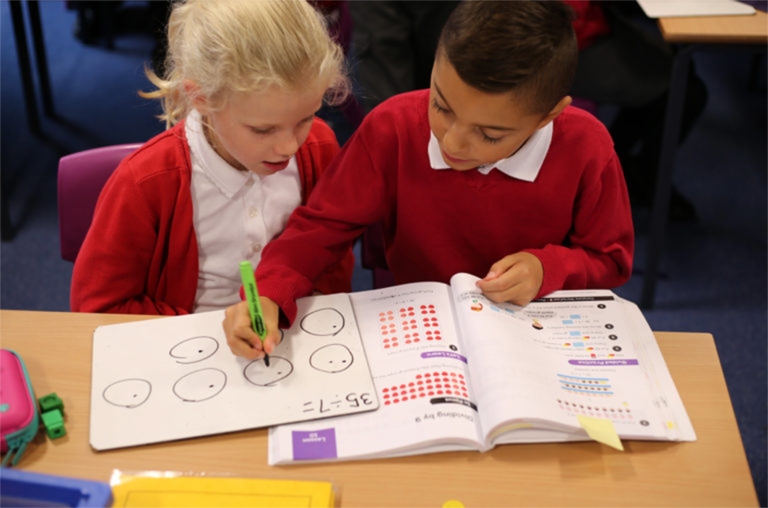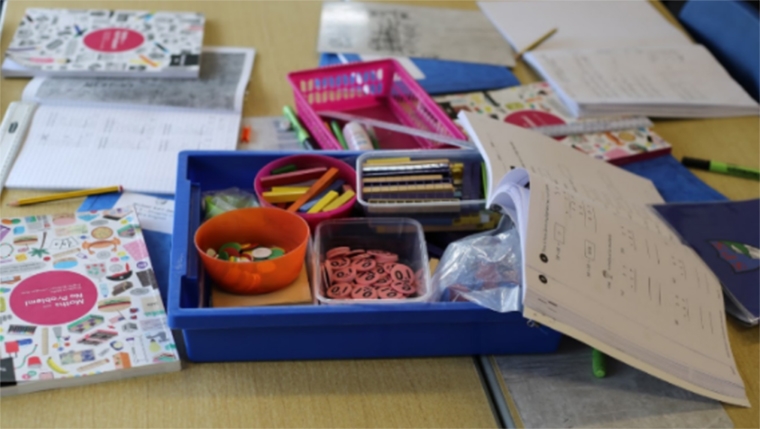Creating Maths Storytellers
Editor’s Note:
This is an updated version of a blog post published on December 23, 2016
Our passion has always been to develop learning and teaching across the school. We have been a successful lead Talk For Writing School in Brighton and Hove for the past three years and wanted to replicate this success in mathematics by helping to create maths storytellers.
We have a fantastic team with good maths teaching standards and national maths data, but we felt ready for a change. Saltdean Primary seems to attract the brave and the curious, and the introduction of the new maths curriculum and the need to teach to greater depth led us to question our outlook and ask ‘How do we need to teach maths?’
“Saltdean Primary seems to attract the brave and curious.”
– Katy Reeve
I am so glad I came across Maths — No Problem! and persuaded my Headteacher and Maths Subject Lead to join me back in January 2016 for a three-day maths course run by Dr Yeap Ban Har. We were so inspired and enlightened that we put together a plan which has changed our school much for the better.
Three big changes I have observed in our maths learners

Our children are becoming storytellers during maths sessions. Guided by the Maths — No Problem! lesson plans and CPD resources, teachers ask key questions and children explore their understanding. We had previously taken this for granted. The process has uncovered some pretty uncomfortable maths misconceptions formed by procedural learning, especially by our ‘rapid graspers’. Pupils of all abilities have begun to grow as confident and capable mathematicians with a rich mathematical language. They feel they have a maths story to tell and the language they need to tell it.
We value and encourage a growth mindset in pupils, however, throughout this process, staff have also had to develop their own growth mindset culture. In order to move forward with how we teach maths, we have needed to become comfortable with questioning our own practice without feeling as if we are being judged. By developing a real understanding of how it feels to be asked to take risks and to be comfortable with not knowing or wrestling with concepts, our teachers have become strong role models for their pupils.

Using the Concrete, Pictorial, Abstract approach to teach all mathematical concepts, in all year groups, has enabled pupils of all abilities to develop their understanding around a key mathematical objective. Practical resources have quickly and successfully been incorporated into maths sessions for all abilities. Deepening understanding has made using resources an enriching experience, especially for our ‘rapid graspers’.
Transform Your Maths Assessment
Insights — our online assessment tool — gives you instant, powerful data to identify gaps and improve results.

Our school ethos has changed
Nearly a year on, Saltdean Primary is on a journey; a journey that is going to change everything. Maths — No Problem! has not just developed our understanding of how to teach maths mastery, it has changed our school ethos, our understanding of how children learn best and what our role needs to be as teachers and facilitators.
And our results?
I’m proud to say that we are in top 5 per cent nationally for maths progress at KS2.
Watch our interview with the Headteacher at Saltdean, Suzanne Morgan
Katy Reeve is Assistant Head at Saltdean Primary School, East Sussex. Katy led the implementation of Maths — No Problem across Saltdean Primary in September 2016, alongside the Maths Subject Leader, after first testing the approach in Year 5.
